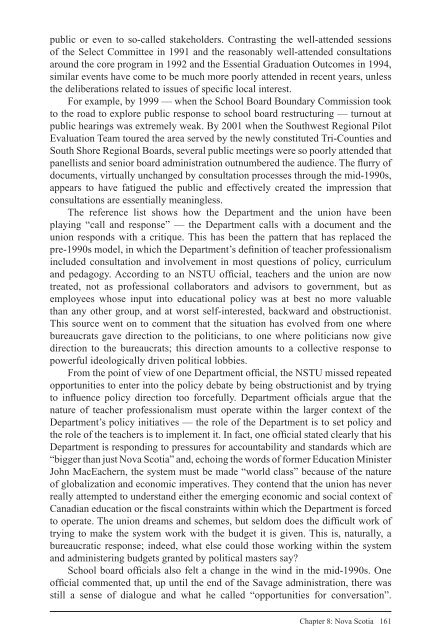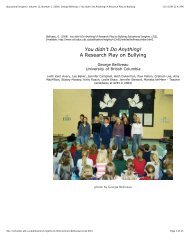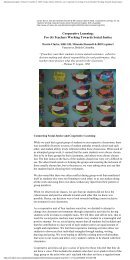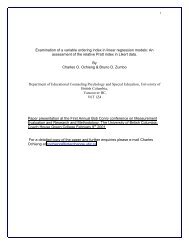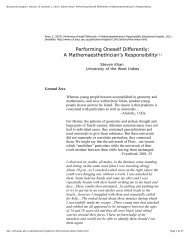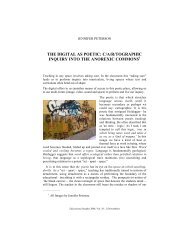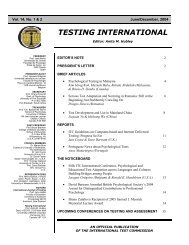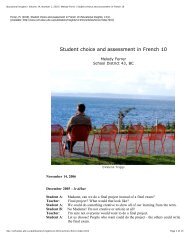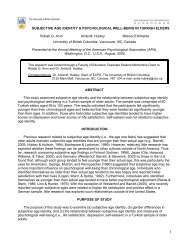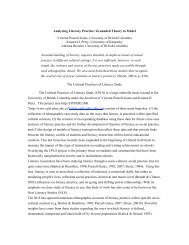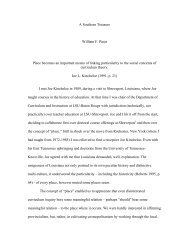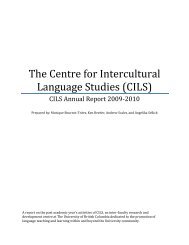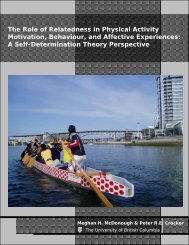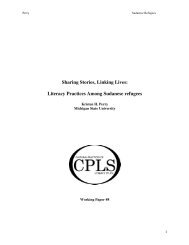The evolution of professionalism - Centre for Policy Studies in ...
The evolution of professionalism - Centre for Policy Studies in ...
The evolution of professionalism - Centre for Policy Studies in ...
You also want an ePaper? Increase the reach of your titles
YUMPU automatically turns print PDFs into web optimized ePapers that Google loves.
public or even to so-called stakeholders. Contrast<strong>in</strong>g the well-attended sessions<br />
<strong>of</strong> the Select Committee <strong>in</strong> 1991 and the reasonably well-attended consultations<br />
around the core program <strong>in</strong> 1992 and the Essential Graduation Outcomes <strong>in</strong> 1994,<br />
similar events have come to be much more poorly attended <strong>in</strong> recent years, unless<br />
the deliberations related to issues <strong>of</strong> specifi c local <strong>in</strong>terest.<br />
For example, by 1999 — when the School Board Boundary Commission took<br />
to the road to explore public response to school board restructur<strong>in</strong>g — turnout at<br />
public hear<strong>in</strong>gs was extremely weak. By 2001 when the Southwest Regional Pilot<br />
Evaluation Team toured the area served by the newly constituted Tri-Counties and<br />
South Shore Regional Boards, several public meet<strong>in</strong>gs were so poorly attended that<br />
panellists and senior board adm<strong>in</strong>istration outnumbered the audience. <strong>The</strong> fl urry <strong>of</strong><br />
documents, virtually unchanged by consultation processes through the mid-1990s,<br />
appears to have fatigued the public and effectively created the impression that<br />
consultations are essentially mean<strong>in</strong>gless.<br />
<strong>The</strong> reference list shows how the Department and the union have been<br />
play<strong>in</strong>g “call and response” — the Department calls with a document and the<br />
union responds with a critique. This has been the pattern that has replaced the<br />
pre-1990s model, <strong>in</strong> which the Department’s defi nition <strong>of</strong> teacher pr<strong>of</strong>essionalism<br />
<strong>in</strong>cluded consultation and <strong>in</strong>volvement <strong>in</strong> most questions <strong>of</strong> policy, curriculum<br />
and pedagogy. Accord<strong>in</strong>g to an NSTU <strong>of</strong>fi cial, teachers and the union are now<br />
treated, not as pr<strong>of</strong>essional collaborators and advisors to government, but as<br />
employees whose <strong>in</strong>put <strong>in</strong>to educational policy was at best no more valuable<br />
than any other group, and at worst self-<strong>in</strong>terested, backward and obstructionist.<br />
This source went on to comment that the situation has evolved from one where<br />
bureaucrats gave direction to the politicians, to one where politicians now give<br />
direction to the bureaucrats; this direction amounts to a collective response to<br />
powerful ideologically driven political lobbies.<br />
From the po<strong>in</strong>t <strong>of</strong> view <strong>of</strong> one Department <strong>of</strong>fi cial, the NSTU missed repeated<br />
opportunities to enter <strong>in</strong>to the policy debate by be<strong>in</strong>g obstructionist and by try<strong>in</strong>g<br />
to <strong>in</strong>fl uence policy direction too <strong>for</strong>cefully. Department <strong>of</strong>fi cials argue that the<br />
nature <strong>of</strong> teacher pr<strong>of</strong>essionalism must operate with<strong>in</strong> the larger context <strong>of</strong> the<br />
Department’s policy <strong>in</strong>itiatives — the role <strong>of</strong> the Department is to set policy and<br />
the role <strong>of</strong> the teachers is to implement it. In fact, one <strong>of</strong>fi cial stated clearly that his<br />
Department is respond<strong>in</strong>g to pressures <strong>for</strong> accountability and standards which are<br />
“bigger than just Nova Scotia” and, echo<strong>in</strong>g the words <strong>of</strong> <strong>for</strong>mer Education M<strong>in</strong>ister<br />
John MacEachern, the system must be made “world class” because <strong>of</strong> the nature<br />
<strong>of</strong> globalization and economic imperatives. <strong>The</strong>y contend that the union has never<br />
really attempted to understand either the emerg<strong>in</strong>g economic and social context <strong>of</strong><br />
Canadian education or the fi scal constra<strong>in</strong>ts with<strong>in</strong> which the Department is <strong>for</strong>ced<br />
to operate. <strong>The</strong> union dreams and schemes, but seldom does the diffi cult work <strong>of</strong><br />
try<strong>in</strong>g to make the system work with the budget it is given. This is, naturally, a<br />
bureaucratic response; <strong>in</strong>deed, what else could those work<strong>in</strong>g with<strong>in</strong> the system<br />
and adm<strong>in</strong>ister<strong>in</strong>g budgets granted by political masters say?<br />
School board <strong>of</strong>fi cials also felt a change <strong>in</strong> the w<strong>in</strong>d <strong>in</strong> the mid-1990s. One<br />
<strong>of</strong>fi cial commented that, up until the end <strong>of</strong> the Savage adm<strong>in</strong>istration, there was<br />
still a sense <strong>of</strong> dialogue and what he called “opportunities <strong>for</strong> conversation”.<br />
Chapter 8: Nova Scotia 161


